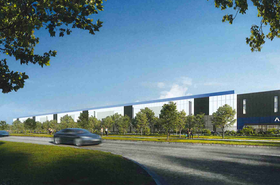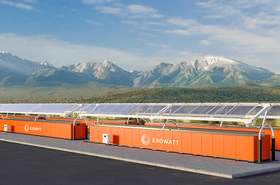Quantum Loophole isn’t commenting on the news that Aligned has pulled out of its Maryland campus.
However, as Aligned stormed off, it commented that Maryland's decision to limit diesel generators on its proposed site could be a "fatal signal" to the data center industry in the whole state, not just to Quantum Loophole.
And any other hyperscale data center development will need similar backup, which is clearly a big problem for a campus that is looking to fill a potential 2GW development.
Rowan keeps quiet
Rowan Digital Infrastructure announced a similar hyperscale plan at Quantum Loophole this month. It has yet to go through planning permission, and has not specified its backup plans.
Quantum Loophole told DCD that it is just the land developer, and backup is a matter for Rowan or other developers. In turn, Rowan says it has nothing to add to comments on its website, which say that “the decision about what kind of backup energy technology will ultimately be made by the end user.”
But actually, it’s a decision that seems to rest largely in the hands of Maryland’s Public Services Commission, which effectively blocked Aligned’s plans for a bank of diesel generators.
Instead of permitting diesel generators on an individual basis, the Commission aggregated them and considered them as a single 504MW generating plant,
In an August meeting, Commissioner Bonnie Suchman said it could not exempt the diesel generators, which were “about the worst choice that you can make right now, even if it's for backup,” and asked Aligned to consider “more environmentally responsible approaches."
Suchman wanted Aligned to use a microgrid with lower-carbon backup power, and Aligned said it had looked at other backup technologies and “unfortunately, they were just not technically or economically feasible for this project."
Following that meeting, Maryland told Aligned it could have an exemption for 70MW of generators for the first phase, and apply for a certificate of public convenience and necessity (CPCN) for future diesels.
In a succinct letter from its attorney, Aligned said this would not provide enough backup power for even the first phase of the project. Beyond that, the lack of clarity would blight any investment: it would require Aligned to invest more in the project despite doubt that backup generators would be allowed.
“No company could invest the hundreds of millions of dollars needed to complete the first phase of the project with that uncertainty hanging over the project,” said Aligned’s letter.
The letter said it was “unfortunate” that the decision came after the company had invested tens of millions of dollars in the project, and predicted that blocking diesel would cost the state “billions of dollars – and at least 48,000 jobs – in further economic development”.
Those figures are based on the whole Quantum Loophole campus and come from the Maryland Tech Council’s statement in support of the Quantum Loophole development.
Aligned suggested that the CPCN process shouldn’t apply to backup power, and repeated its assertion that a set of individual generators that sit on a single site and are used for backup are not a “generating station."
What next?
This story is definitely not over. Frederick County’s local government wants the Quantum Loophole campus, although there are definitely some objections.
At the state level, there are two conflicting policy directions. Maryland wants the data center revenue, but it doesn’t want diesel emissions.
Aligned points out that some existing institutions, like hospitals and colleges, may already have breached the guidelines which tripped up the data center provider, and makes a clear request that the state think again.
It’s also worth noting in passing one surprising aspect of the argument. In various European countries, data centers are increasingly offering their backup systems as “demand-response” capacity to support the grid, which could benefit society and reduce the amount of fossil power stations needed for short-term generation.
In Maryland, this kind of integration is explicitly ruled out. To qualify its diesel as “not a generating station,” Aligned had to assure the Commission that they’d never be offered in such a socially useful way.
There’s a possibility that future projects, including Rowan, might come up with an acceptable low-carbon backup option, based around biofuel or batteries.
But Aligned doesn’t think these are practical. It says bluntly that the Commission’s decision has “sent a negative – and perhaps fatal – signal” to Maryland’s nascent data center industry, and predicts that builders will go elsewhere.





